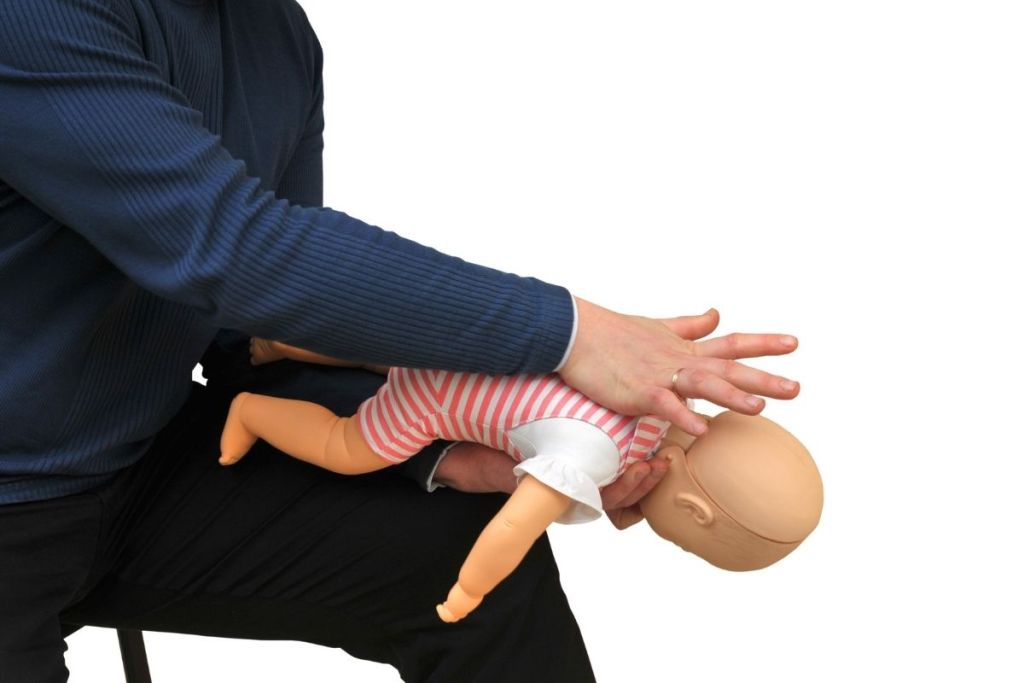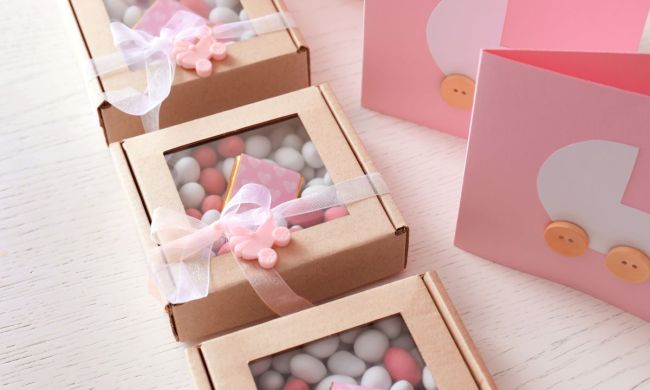One of the scariest moments as a parent is when everything goes from normal one minute to an emergency the next. You want to be prepared for if that moment comes, especially when it comes to knowing exactly what to do if your baby is choking.
If you suspect your baby is choking, stay calm and call for help while you start launching into the steps below. Assess the situation to know if you should move forward with first aid or not — if your baby is coughing or crying or breathing, then you should not perform the steps below. Read on to learn all about exactly what to do if your baby is choking.

What to do if a baby is choking
First, according to the National Library of Medicine, tell someone to call 911 while you begin first aid and shout for help to alert anyone nearby.
Experts advise, “DO NOT perform choking first aid if the infant is coughing forcefully, has a strong cry, or is breathing enough.” Coughing on his or her own is the best way for a baby to clear the airway and you shouldn’t interfere in any way, including by trying to grasp the object or pull it out. You could end up pushing the object further down the baby’s windpipe. If the baby is coughing, crying, or breathing, do not engage physically because these sounds mean the child is able to draw breath.

How do I stop my baby from choking?
If your baby is not coughing forcefully or does not have a strong cry, follow these four steps:
Lay your baby along your forearm face down and give five quick, forceful blows between the baby’s shoulder blades.
Use your thigh or lap for support and hold the baby’s chest in your hand and their jaw with your fingers. Point their head down and keep it lower than their body. Use your palm to make the blows.
If the object does not come out of the airway after five blows, turn your baby face up and give five quick thrusts on the chest.
Use your thigh or lap to support your baby’s head while they are face up. Place two fingers on the middle of their breastbone just below the nipples. Give up to five quick thrusts down, compressing the chest one-third to one-half the depth of the chest.
Continue five back blows followed by five chest thrusts until the object is dislodged or the infant becomes unconscious.
If the item becomes dislodged, still follow up with your baby’s doctor afterward even if your child seems fine.
If the baby becomes unresponsive, give them CPR and call 911.
If the baby stops breathing, becomes unconscious, or turns blue, shout for help, start giving CPR, and call 911. At this point, if you can see the object blocking the airway, try to remove it with your finger (only if you can see it).
What do babies choke on most?
The size of a young child’s windpipe is about the width of a drinking straw, so anything larger than that could get lodged in it. That means the baby has to chew really well and keep anything smaller out of their mouth.
The most common cause of nonfatal choking in young children is food. Choking hazard foods include:
- hot dogs (especially cut into a coin shape), meats, sausages, and fish with bones
- popcorn, chips, pretzel nuggets, and snack foods
- candy (especially hard or sticky candy), cough drops, gum, lollipops, marshmallows, caramels, hard candies, and jelly beans
- whole grapes, raw vegetables, raw peas, fruits, fruits with skins, seeds, carrots, celery, and cherries
- dried fruits, sunflower seeds, all nuts, including peanuts
- peanut butter, (especially in spoonfuls or with soft white bread)
- ice cubes and cheese cubes
When introducing solid foods to babies and feeding them to young children, cut up anything round like hot dogs and grapes to reduce choking hazards.
Babies also choke on household items. Coins, marbles, pen caps, button batteries, screws, bean bag chair stuffing, holiday decorations, erasers, earrings, rings, staples, balloons, medicine syringes, and small stones are all common culprits. Nearly half of all choking deaths among children are caused by balloons.
What to do if baby is choking: Assess first
If the baby can cough, cry, or breathe, do not stick your finger in their mouth, slap their back, move them, or otherwise touch them. Letting your baby cough is the best thing to do, and moving them around could move the object, making matters worse. However, if you know your child swallowed a dangerous item like a button battery that could corrode their organs, take them immediately to the emergency room.



